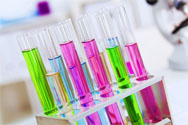您的位置:首页 > 产品中心 > SYLGARD® 170 灌封胶
SYLGARD® 170 灌封胶
SYLGARD® 170 silicone elastomer
产品别名
SYLGARD® 170 灌封胶
SYLGARD® 170 silicone elastomer
Polydimethylsiloxane
Silicone
PDMS
Silicone Rubber
Curing agent
硅橡胶
聚二甲基硅氧烷
固化剂
硅树脂
结构式
产品性质
| Quality Level【质量水平】 | 100 |
| description【描述】 | Form: Black liquid (part A), off-white liquid (part B) Viscosity: 3160 cPs (part A), 1110 cPs (part B) |
基本信息
| General description【一般描述】 | 特性:
如何使用: 混合:SYLGARD® 170 灌封胶在双注射器涂抹器中提供,带有由 A 部分和 B 部分组成的静态混合器。将两种成分(预称重)在注射器涂抹器中以 1:1 比例混合,应充分混合直到混合物颜色均匀。建议使用真空除气。在 5-10 分钟内施加 10-20 mmHg 的残余压力将对材料充分除气。 固化:SYLGARD® 170 灌封胶应使用以下推荐的时间表之一进行固化:
大型部件和组件可能需要更长的时间才能达到固化温度。 某些化学药品、固化剂和增塑剂会抑制固化。这些包括:
对于大多数应用,硅橡胶型灌封胶应在 -45 至 200℃(-49 至 392°F)的温度范围内长时间运行。 |
| Application【应用】 | SYLGARD® 170 灌封胶适合用作密封剂或灌封材料。 潜在应用:
|
| Preparation Note【制备说明】 | MIXING AND DE-AIRING - These products are supplied in a 1 to 1 mix ratio, which is very robust in manufacturing environments and allows for some process and dispense equipment variation. In most cases de-airing is not required. PREPARING SURFACES - In applications requiring adhesion, priming will be required for many of the silicone encapsulants. For best results, the primer should be applied in a very thin, uniform coating and then wiped off after application. After application, it should be thoroughly cured prior to application of the silicone elastomer. Additional instructions for primer usage can be found in the information sheets specific to the individual primers. PROCESSING/CURING - Thoroughly mixed Dow silicone encapsulants may be poured/dispensed directly into the container in which it is to be cured. Care should be taken to minimize air entrapment. When practical, pouring/dispensing should be done under vacuum, particularly if the component being potted or encapsulated has many small voids. If this technique cannot be used, the unit should be evacuated after the silicone encapsulant has been poured/ dispensed. Dow silicone encapsulants may be either room temperature (25℃/77°F) or heat cured. Room temperature cure encapsulants may also be heat accelerated for faster cure. Ideal cure conditions for each product are given in the product selection table. POT LIFE AND CURE RATE - Cure reaction begins with the mixing process. Initially, cure is evidenced by a gradual increase in viscosity, followed by gelation and conversion to a solid elastomer. Pot life is defined as the time required for viscosity to double after Parts A and B (base and curing agent) are mixed and is highly temperature and application dependent. USEFUL TEMPERATURE RANGES - For most uses, silicone encapsulants should be operational over a temperature range of -45 to 200℃ (-49 to 392°F) for long periods of time. However, at both the low- and high temperature ends of the spectrum, behavior of the materials and performance in particular applications can become more complex and require additional considerations and should be adequately tested for the particular end use environment. For low-temperature performance, thermal cycling to conditions such as -55℃ (-67°F) may be possible, but performance should be verified for your parts or assemblies. Factors that may influence performance are configuration and stress sensitivity of components, cooling rates and hold times, and prior temperature history. At the high temperature end, the durability of the cured silicone elastomer is time and temperature dependent. As expected, the higher the temperature, the shorter the time the material will remain useable. COMPATIBILITY - Certain materials, chemicals, curing agents and plasticizers can inhibit the cure of addition cure gels. Most notable of these include: organotin and other organometallic compounds, silicone rubber containing organotin catalyst, sulfur, polysulfides, polysulfones or other sulfur containing materials, unsaturated hydrocarbon plasticizers, and some solder flux residues. If a substrate or material is questionable with respect to potentially causing inhibition of cure, it is recommended that a small scale compatibility test be run to ascertain suitability in a given application. The presence of liquid or uncured product at the interface between the questionable substrate and the cured gel indicates incompatibility and inhibition of cure. |
| Legal Information【法律信息】 | Sylgard is a registered trademark of The Dow Chemical Company or an affiliated company of Dow |
安全信息
| Pictograms【象形图】 | GHS09 |
| Signal word【警示用语:】 | Warning |
| Hazard Statements | H410 |
| Hazard Classifications【危险分类】 | Aquatic Acute 1 - Aquatic Chronic 1 |
| Storage Class Code【储存分类代码】 | 12 - Non Combustible Liquids |




